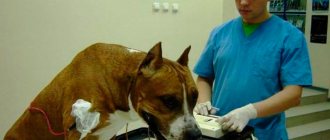Dogs, just like people, are susceptible to cardiovascular diseases, which can occur in both young and very advanced individuals. Cardiovascular diseases can be congenital or acquired. The dog should be regularly examined by a veterinary cardiologist in order to identify this condition in time and begin treatment on time. Let's look together at what heart diseases there are in dogs .
Common symptoms of heart disease in dogs
Despite the variety of reasons why cardiovascular diseases can occur, there are common symptoms , and they will allow you to confidently decide that this is a heart problem.
- Heart disease in dogs is accompanied by a number of symptoms:
- The mucous membranes and skin become bluish due to lack of oxygen and poor circulation;
- The dog becomes very passive, preferring to lie on the sofa instead of active games;
- When listening, heart murmurs are clearly audible;
- Various edema, dropsy of unknown etiology;
- Shortness of breath, tachycardia at the slightest exertion.
If you notice at least one of these symptoms in your dog, you should immediately put everything aside and seek qualified help.
to the veterinary.
Symptoms for urgent contact with a veterinarian
You should immediately contact a specialist if you notice the following symptoms in your pet:
- Dry cough after minor physical activity.
- The same cough, seriously worsening at night.
- Constant and severe shortness of breath.
- Weight loss. Many people believe that with heart disease, exhaustion develops gradually, but this is not entirely true. In severe cases, the dog can lose a lot of weight in just a couple of weeks.
- Fatigue, the dog gets very tired, even just walking up the stairs.
- Cases of fainting or "twilight" consciousness.
- The dog cannot sit and immediately begins to choke. This should also include cases of severe abdominal bloating (due to ascites, that is, dropsy of the abdominal cavity).
Heart disease in dogs: what are they? List
Congestive cardiac pathology - heart disease in dogs
With a pathology such as congestive cardiac pathology , the heart muscle cannot cope with pumping blood through the circulatory system.
- Symptoms of pathology:
- a saggy, swollen abdomen, which becomes so as a result of the development of ascites;
- the animal rapidly loses weight in a short period of time;
- cyanosis of mucous membranes;
- if everything is bad, then fainting is possible due to lack of oxygen.
If you notice at least one of these symptoms, schedule a visit to your veterinarian as soon as possible, who will prescribe all the necessary tests.
Myocarditis - heart disease in dogs
Any infectious diseases can provoke a disease such as myocarditis .
- The clinical picture of the disease is as follows:
- obvious rhythm disturbance;
- a cardiac dry cough that does not let go of the animal for a minute;
- the dog gets tired quickly;
- normal breathing is difficult;
- the animal prefers to lie motionless most of the day;
- Additional symptoms similar to poisoning are possible.
Owners should also keep in mind that the disease can be divided into two stages.
- For first stagecharacteristic:
- tachycardia;
- extrasystole;
- pain in the heart area;
- the heartbeat becomes stronger.
In the second stage, the impulse of the heart muscles weakens significantly, which can be seen on an ECG, which can be done at the veterinary and learn everything about the condition of the pet’s heart.
Myocardosis - heart disease in dogs
The etiology of this disease is not inflammatory at all. Doctors suggest treating this condition based on the situation, selecting a drug based on the symptoms. The causes of this condition have not yet been precisely clarified and thousands of scientists continue to study them.
- However symptoms of myocardosis in a dogmay be as follows:
- shortness of breath, blue discoloration of mucous membranes and skin;
- venous pressure increases significantly, while arterial pressure drops significantly;
- the pulse becomes indistinct and weak;
- if the process is strongly started, then the push is weak and is not felt as it should be.
Diagnosis is still carried out using ECG, ultrasound and similar studies, which can be carried out in our veterinary office.
Endocarditis - heart disease in dogs
This is a disease of inflammatory etiology
.
In such a situation, the “insides” of the heart muscle are affected, namely the ventricles and atria. Endocarditis is a direct consequence of the plague, also toxic parasitic worms that have settled in the intestines. This condition can be both acute and chronic, and its etiology is ulcerative and warty. If the disease is missed, the symptoms gain momentum and already pose a real threat to the health and life of the pet. In this condition, emergency assistance from a veterinarian is required, and first of all, drugs are prescribed that stimulate cardiac activity, and then those that relieve pain and other unpleasant symptoms are prescribed.
Myocardial infarction - heart disease in dogs
Myocardial infarction is a disease that occurs not only in humans. Dogs are also susceptible to it. This heart disease is characterized by the fact that the flow of blood to a certain area of the heart stops and a real emergency arises, which requires immediate intervention by veterinary specialists. If the area of soft tissue damage is not large, then the dog has a significant chance of salvation, which must certainly be taken advantage of. Otherwise, death is possible and doctors can only declare the death of the animal.
How are heart murmurs detected?
Auscultation (listening with a phonendoscope) is a physical diagnostic method that allows you to assess heart rhythm, the presence of murmurs, and the condition of the upper/lower respiratory tract. Always used during the initial examination of the animal. Allows you to make a preliminary diagnosis and, if necessary, refer the patient for further cardiac examination. Please be aware that a number of factors may make it difficult for your pet to auscultate, such as obesity, severe wheezing, or the presence of free fluid in the pleural cavity (hydrothorax).
To describe the nature of the noise, a number of parameters are introduced:
Maximum noise intensity point
(the noise is heard as loud as possible):
- Left side: base of the heart (pulmonary valve/aortic valve); apex of the heart (mitral valve).
- Right side: middle of the heart (tricuspid valve), edge of the sternum (ventricular septal defect).
Noise intensity.
It should be remembered that a strong murmur does not always correspond to severe changes in the heart. For example, a decrease in the intensity of noise during mitral valve endocardiosis in dogs as the problem progresses indicates a deterioration in the functional ability of the heart, and vice versa, a very loud noise can be observed in the initial stages of the disease.
Noise intensity is assessed on a 6-point scale (from 1 to 6):
- Grade 1 – very soft localized noise, detected after a few minutes of listening.
- Grade 2 – soft noise, small area of localization, detected immediately.
- Grade 3 – noise of moderate intensity, detected immediately.
- Grade 4 - moderate/loud murmur, usually auscultated on both sides of the chest. There is no precordial vibration.
- Grade 5 – loud noise, vibration, large listening area.
- Grade 6 – a very loud noise, detected immediately when a stethoscope is brought to the chest.
Time of noise occurrence.
Systolic murmur - occurs during systole (heart contraction). A typical example is mitral valve endocardiosis in dogs.
Diastolic murmur - during diastole (expansion of the heart). It is extremely rare, low intensity is typical. An example is aortic insufficiency.
Constant murmur - heard during cardiac systole and diastole. Characterized by high intensity, typical of patent ductus arteriosus.
Diagnosis of cardiovascular diseases, heart disease in dogs
The doctor can prescribe a variety of diagnostic methods depending on the results of the in-person examination:
- ECG - allows you to track the frequency of contractions of the heart muscle;
- Ultrasound - will allow you to notice even the smallest heart defects and quickly eliminate them;
- A biochemical blood test will allow you to track the slightest changes in the composition of the red liquid and promptly prescribe the necessary medications.
Using all these methods and a visual examination by a doctor, you can get a 100% reliable result in the shortest possible time.
Which dogs are most susceptible to heart disease?
Heart disease can affect any dog, from the Tibetan Mastiff to the Maltese. Heart disease does not depend on age. They are capable of striking both old and young creatures. Here, you can only rely on the luck and efficiency of veterinarians. If in the first case the situation cannot be influenced in any way, then in the second you can contact a veterinarian because this is where experienced cardiologists work, who are ready to provide qualified assistance related to cardiac problems at any time of the day.
It is possible to leave even late at night, because as you know, the likelihood of heart attacks occurs in the pre-dawn time. Remember that the slightest sign of cardiovascular disease should not be ignored! A minute of delay can cost the animal's life.
How is the diagnosis carried out?
There are several tests that are used to assess the situation when a dog has noises. All of them provide valuable information to the veterinary cardiologist in determining various aspects of cardiac function.
- Auscultation is listening to sounds with a stethoscope. This valuable tool allows you to identify murmurs, their location and intensity, abnormal heart rhythms (arrhythmias), and unusual lung sounds.
- Blood and urine tests. These tests do not provide direct information about heart function, but they provide insight into other disorders in the body that may affect heart function and the treatment of heart disease.
- Chest X-rays. Any changes are clearly visible on x-rays, which gives a better idea of the condition of the lungs, the size, shape and degree of expansion of the heart.
- Electrocardiogram. Assessing the electrical activity of the heart can determine the heart rate and more accurately identify any arrhythmias that may be present.
- An ultrasound (sonogram or echocardiogram) is a common test performed by a veterinarian to determine the cause of the murmur. This test uses sound waves that bounce off structures of the heart and create images on a television monitor. Ultrasound examinations provide the most accurate determination of the size of each chamber, allow you to measure wall thickness, detect overload, and provide information about the occurrence of possible arrhythmias, blockade, and the degree of hypoxia. The image on the monitor is in real time, so you can evaluate the heart contractions and measure their actual strength.
The combination of all these tests gives a better assessment of the dog's condition, provides information about its heart function and allows the selection of the correct pharmacological therapy. The results of the examination are studied by a cardiologist, and he prescribes the necessary medications, prescribes an individual treatment schedule, diet and lifestyle for the dog.
Nutrition for cardiovascular diseases, heart disease in dogs
Nutrition for heart disease in dogs should be low in calories, easily digestible, and an abundance of proteins is welcome. Proteins will help restore normal metabolism and make your dog more resilient and healthy. At first, after surgery (if necessary), it is recommended to feed the animal semi-liquid food through a syringe without a needle, gradually making the consistency more and more solid.
- The diet is allowed to include:
- kefir;
- dairy products;
- boiled chicken;
- boiled vegetables;
- lean meat (a little);
- Perhaps the dog will like soaked dried apricots. It is a source of potassium for both humans and animals. Offer 1-2 pieces per week.
All these products should be given carefully and only in those proportions and quantities prescribed by a veterinarian, or even better, a cardiologist. After all, it is cardiologists who are most closely involved in the study of heart diseases.
What causes heart murmurs
- Valve insufficiency.
- Valvular stenosis.
- Communication between the chambers of the heart (ventricular/atrial septal defect).
- Communication between large vessels (patent ductus arteriosus).
Various conditions not associated with structural changes in the heart.
- Low blood viscosity (low content of red blood cells, red blood cells; low protein content).
- When blood flows through large vessels in young animals.
- When there is an increase in the volume of blood passing through a normal valve due to the presence of a ventricular/atrial septal defect.
Heart disease in dogs. How to help your pet?
A trip to a veterinary center for heart disease in dogs, even in the kindest atmosphere, is a tremendous stress for your four-legged friend. That is why our I-VET doctors make full use of modern technologies in the world of veterinary medicine in order to minimize the stress from the treatment procedures. ECG and ultrasound can now be done at home. In addition to the veterinarian, you can invite other specialists to your home who will be happy to help solve the problem:
- Cardiologist is a specialist in cardiovascular diseases.
- Dentist.
- Nephrologist.
- Endocrinologist.
- Neurologist.
- Ophthalmologist.
- Ultrasound specialist.
- Nurse.
The visit of each such doctor must be paid separately. A cardiologist is a highly specialized specialist who has deeper knowledge of his field than an ordinary veterinarian.
Acute and chronic heart failure: differences
Acute heart failure (AHF) . Its main difference is its high speed of development. In dogs, it develops against the background of large blood loss, severe infectious diseases, etc. In addition, it can occur at some stages of chronic heart failure (CHF). In case of AHF, emergency first aid by professionals is required. Only in a veterinary clinic will it be possible to relieve the pet’s acute condition.
Chronic heart failure (CHF) . Among the most common reasons: hormonal imbalances and excessive physical activity that does not correspond in intensity to the animal’s body weight. The main difference is the slow and constant increase in clinical signs over several months or even years. All symptoms manifest themselves in stages: from breathing problems to ascites. In addition, chronic heart failure is characterized by severe exhaustion of the pet.
Noise level. What it is?
Graduation by degree allows you to describe the strength of the noise. There are 6 degrees. The lower the degree, the quieter the noise. Sometimes, however, it is easier to describe the noise as mild, moderate, or severe. Veterinarians use a wide range of specific terms to clarify the nature of the noise; these terms help to most accurately characterize the noise and associate it with a particular pathology of the heart or valve.
Noise level is a very subjective parameter. Noise is difficult to detect when the animal is excited or irritated, since breathing becomes more frequent in such conditions. Usually, only an experienced cardiologist can register a grade 1 murmur. Noises of the 5th and 6th degrees are so strong that they are clearly audible through the chest wall at a distance.
What should you do if your animal has a heart murmur? In some cases, already during a clinical examination, the cause of the heart murmur can be determined. But to be more confident, it is still recommended to continue the examination to confirm the diagnosis and determine the stage of the disease. The prognosis of the disease—what to expect in the future—depends on the results of the examination. For pedigree dogs that are used for breeding, noise may indicate the presence of a hereditary disease that is passed on to the offspring.
The general practitioner may prescribe additional diagnostic examinations - x-rays, ECG and laboratory tests, and refer you for a consultation with a cardiologist for a cardiac examination and echocardiography. An individual diagnostic plan is drawn up for each animal.
Treatment of an attack
After providing first aid, the doctor must conduct additional tests, with the help of which further treatment will be prescribed. Mandatory tests:
- blood tests. The first thing the doctor should do. This is the only way to know the condition of the animal;
- performing ultrasound of the heart and atrium. Ultrasound is not always effective in cases where the animal has thick and long hair;
- X-ray. Needed to see possible rib damage during a heart attack;
- ECG. Such an examination is very rarely carried out, but it best shows the condition of the blood vessels and areas that are susceptible to disease.
Sometimes heart attacks occur in puppies, in which case doctors talk about the rapid growth of internal organs and insufficient calcium. This is often evidence of genetic pathologies. In such cases, treatment is carried out with antibiotics to restore the lining of the heart.
Which dogs are at risk, or “Sport is not life”?
Small dogs rarely suffer from cardiac cough; dogs of medium breeds are also not too predisposed to diseases of the cardiovascular system, but “giants” are bad in this regard. Various Great Danes, Mastiffs, St. Bernards, and other “giants” are at risk. They have diseases of the cardiovascular system most often.
This is explained by the specific physiological characteristics of such dogs. Their muscle mass (when compared with ordinary dogs) is greatly increased, but the size of the heart differs little from the size of this organ in the “average” dogs. That is, for the time being it can somehow compensate for the load, but sooner or later the reserves are completely exhausted.
For some reason, many owners are firmly convinced that their huge Great Dane is an excellent athlete. There have been cases when unfortunate dogs ran real cross-country races behind sports motorcycles. Remember that with this mode of “operation” the heart of a large animal may well fail at the age of five or six years.











